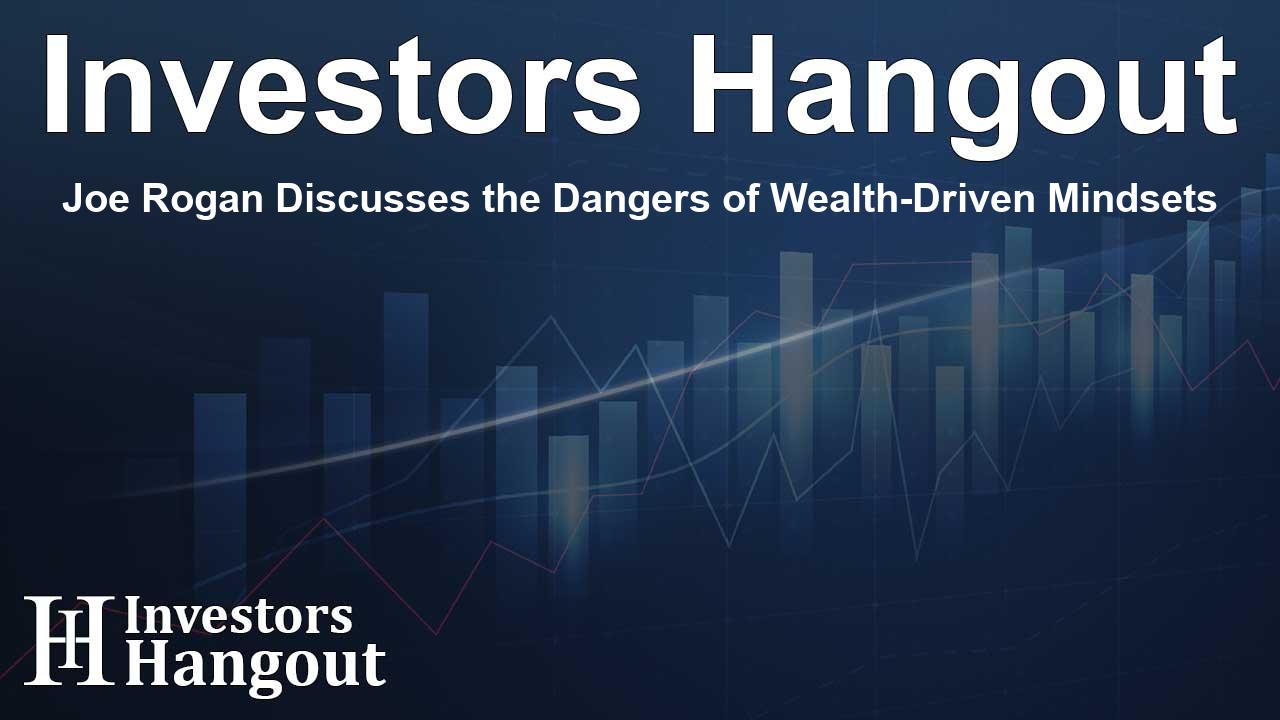Joe Rogan Discusses the Dangers of Wealth-Driven Mindsets

Joe Rogan's Perspective on Wealth and Humanity
Joe Rogan, a well-known comedian and podcast host, has consistently shared his thoughts on societal issues, particularly the detrimental impact of an excessive focus on money. In a recent episode of "The Joe Rogan Experience," he expressed a critical view of the corporate world's approach to wealth accumulation, stressing that the pursuit of money can lead to a disconnection from our own humanity.
Critique of Greed and Its Consequences
During a conversation with fellow comedian Ian Edwards, Rogan remarked on the alarming wealth transfer that occurred during the pandemic. He highlighted how large corporations were granted operational advantages while small businesses faced closures. This disparity raises questions about fairness and justice in economic practices.
Rogan pointed out the absurdity of people being able to patronize big box stores like Target and McDonald's while small business owners were sidelined. He stated, "You can only go to Target during a pandemic. You can’t go to a small business… So where’s all that money go? That money goes to all the other businesses that can stay open—Walmart, Target, all these things flourish." This commentary showcases his concern for the broader implications of wealth concentration.
The Reality of Financial Inequality
The discussion turned to the issue of stimulus checks, with Rogan and Edwards noting that substantial aid often favored massive corporations over everyday individuals. Rogan described this as a form of money being "legally siphoned into other people's businesses," illustrating the stark contrast between the wealth of corporations and the average person's economic struggles.
Rogan's disdain for the mindset of ultra-wealthy individuals was evident. He stated, "There's kinds of people that make money that are only trying to make money... They don’t give a f**k about you. They’re just trying to make more numbers." This assertion reflects his belief that a relentless pursuit of wealth can lead to sociopathy, reinforcing the divide between rich and poor.
Questioning the Need for Excess Wealth
Engaging further, Edwards questioned the perpetual quest for more wealth, asking, "If you get all the money and nobody has anything, do you really have money?" This prompts a fundamental inquiry into the meaning and implications of wealth. Rogan contrasted those who accumulate wealth through innovation, like Elon Musk, with those who strictly chase after numbers without providing value to society.
Rogan highlighted that innovation and creativity should be at the heart of any economic success. He lauded figures like Musk, whose contributions to technology and society serve as a testament to the positive potential of wealth when it is used to create rather than to hoard.
A Call for Conscious Capitalism
In earlier interviews, Rogan has delivered messages encouraging corporate leaders to re-evaluate their priorities. He asserted that life's brevity underscores the importance of making meaningful choices rather than merely focusing on profit maximization. He says, "If the CEOs and all these people realize—like you are going to die... you're not living a harmonious life." This statement serves as an appeal for a shift towards a more compassionate approach in business practices.
Rather than condemning wealth entirely, Rogan advocates for a more ethical perspective on capitalism. He believes that it is possible to achieve financial success while adhering to values that prioritize fairness and equity, stating that one can adopt a "psychedelic capitalist perspective"—a futuristic vision where businesses operate responsibly and ethically.
The Human Cost of Greed
Rogan's argument comes with a clear warning: when profit becomes the sole objective, individuals begin to view others as mere numbers rather than fellow human beings. He poignantly noted, "You get more and more sociopathic as you go down that road." This reflection highlights the critical issue of maintaining empathy within a financial context, emphasizing the need for balance.
Frequently Asked Questions
What is Joe Rogan's stance on wealth?
Joe Rogan warns that focusing solely on wealth can strip away humanity and empathy.
How does the pandemic relate to wealth transfer according to Rogan?
Rogan points out that the pandemic saw a significant transfer of wealth from small businesses to large corporations.
Who does Joe Rogan criticize in his discussions about wealth?
He criticizes ultra-wealthy individuals who prioritize profits over people and societal impact.
What example does Rogan give of an innovator?
Rogan mentions Elon Musk as a positive example of someone whose wealth comes from creating valuable products.
What does Rogan propose for corporate leaders?
He urges CEOs to reconsider their priorities and adopt a more humane approach to business practices.
About The Author
Contact Olivia Taylor privately here. Or send an email with ATTN: Olivia Taylor as the subject to contact@investorshangout.com.
About Investors Hangout
Investors Hangout is a leading online stock forum for financial discussion and learning, offering a wide range of free tools and resources. It draws in traders of all levels, who exchange market knowledge, investigate trading tactics, and keep an eye on industry developments in real time. Featuring financial articles, stock message boards, quotes, charts, company profiles, and live news updates. Through cooperative learning and a wealth of informational resources, it helps users from novices creating their first portfolios to experts honing their techniques. Join Investors Hangout today: https://investorshangout.com/
The content of this article is based on factual, publicly available information and does not represent legal, financial, or investment advice. Investors Hangout does not offer financial advice, and the author is not a licensed financial advisor. Consult a qualified advisor before making any financial or investment decisions based on this article. This article should not be considered advice to purchase, sell, or hold any securities or other investments. If any of the material provided here is inaccurate, please contact us for corrections.
